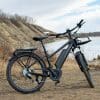The Tourmaster Intake Air Series 2 is one of several Tourmaster jackets that have similar design features. It is available in a number of colors and it is a good choice for a mesh jacket for summer wear, or with the removable liners for cooler weather. It offers style and protection in an adaptable design and it is suitable for a wide range of body sizes.
Tourmaster began about 33 years ago, when the two young guys who owned Southern California’s Helmet House store wanted to add accessories to their core business. Helmets had been their vehicle for learning how to import and retail motorcycle product, and they became the exclusive US distributor for a Japanese company called Shoei and the Korean HJC helmet brand.
Over time, they learned to have their own motorcycle clothing designs manufactured and Tourmaster as a brand became one of the staples of the motorcycle apparel industry. With the increasing popularity of sportbikes, traits that differed from the “Tour” concept became important and the Cortech line was added nine years ago.
The Cortech brand features both textile and leather gear and the line is intended to have edgier designs, slightly flashier characteristics, more of a sportbike cut, and fewer 3/4-length jackets for touring. The sportier Cortech designs are well made and the styling is more restrained than other brands, so the gear will still look sharp and current for more than one season.
Tourmaster continues to be the brand name for solid gear that has a bit more of the traditional styling, and it remains quite popular.
Many of the features described in the Tourmaster Intake Air Series 2 jacket can also be found in other Tourmaster and Cortech products, because they have so many models there is some overlap in the spectrum, from conservative to current and even edgy styles.
For example, in the middle of the lineup, the Tourmaster Intake Air 2 jacket has much that is similar to the Cortech Flex Series 2 jacket (and the Cortech GX Air Series 2), which add leather panels for additional protection.
At the other ends of the spectrum, you won’t find a Cortech version of the more conservative Tourmaster Epic or Advanced 3/4-length jackets, nor will you find a Tourmaster version of the tighter-looking HRX Series 2 Cortech jacket that has a shorter cut, graphics, and hard molded armor.
It’s interesting to note that because of the wide variations in late spring and early summer weather, we were able to evaluate the Tourmaster Intake Air Series 2 jacket in temperatures ranging from the mid-40s (Fahrenheit) to the upper 80s, and in a range of moisture conditions from fog and mist to hard rain.
Tourmaster Intake Air Series 2 Jacket Features
The Tourmaster Intake Air Series 2 is well made and it looks good. In fact, the styling garnered nice compliments from both strangers and other riders.
The jacket provides much better protection than many of the lower priced alternatives, with regards to padding and armor, the amount of coverage, and in the amount of reflective material.
While not having those handy external chest pockets, there are a lot of other pockets which can be used to stash phones, wallets, keys, cash, and other loose items.
I think this is a nice jacket at a good price that is worthy of consideration, and it’s usable with or without the liners. The jacket is meant to be changeable to suit a range of weather conditions with its two inner liners; one or both can be used to broaden the length of the riding season or to match a day of changing conditions.
For example, it may be a bit cool when leaving for work in the morning, so slip in the liners and head out the door. Riding out for lunch may be in hot mid-day sun, so the liners could be taken out for the mesh shell protection. You can then slip the rain liner back in if it is warm and drizzling after work.
At least that was the theory… The reality is that there are so many snaps and fasteners to install the liners, your riding buddies aren’t going to wait around if you want to keep changing configurations. The liners generally are either left in or put on and worn as a separate inner jacket.
With the liners, the jacket is comfortable for hour-long rides in the range of about 50 to the lower 70s. In temperatures below 50 degrees or so, the low cut at the throat leaves too much skin exposed. When it’s warmer than 70, the liner set gets too warm.
But the bottom line is that the liners work well in a jacket that was not really meant to be a true 3-season or rain suit. It’s all about the mesh, and riding on hot days was great with the liners totally removed.
I did try wearing a basic street jacket under the mesh instead of the liners. While a generic street jacket can easily fit into the shell and was comfortable to wear, the liner set installs into the shell as part of an assembly and becomes a relatively small package when removed, so it’s the preferred setup.
Tourmaster Intake Air Series 2 Mesh Jacket Shell
The outer mesh shell of the Tourmaster Intake Air Series 2 is a good-looking main jacket, with rich and solid colors. The model in this test is red with silver and black trim. In addition to the red, the Intake Air Series 2 is also available in blue, silver, white, neon yellow, or all-black versions.
The neon yellow and white are attention getters! The large black shoulders and padded bottoms of the forearms give the jacket a substantial look. You could fit into both the sport bike and touring crowds while wearing this jacket.
Tourmaster says that the material is “Armor-link mesh material and 600 denier Carbolex with 1680 denier ballistic polyester in the impact areas”. Comparing the construction to a low-priced mesh jacket quickly revealed the better materials used in the Tourmaster.
Also immediately apparent when handling the jacket is its weight. Between the cut, the extra material and features, plus the amount of armor and other protection, there is a lot of weight for a mesh shell. I see it as a positive in combining protection with mesh ventilation.
The sides of the collar are actually fairly high around the sides and the interior has a nice microfiber liner to provide a soft feel. The front of the Mandarin-style collar neck line is low, however, but this works with the outer mesh shell.
Because the construction of the shoulder and neck area is not mesh, it completes the side and rear coverage afforded by the rain liner.
When it’s really hot outside, the concept is for the jacket to provide good-looking protection while minimizing the amount of material that is worn. When it gets hot, expect some sweat on the shoulders and where your skin is covered by the generous back armor, but this is the case also with most mesh jackets.
On a hot day the low placement of the hook-and-loop neck tab can provide desired air flow to the front of a rider’s neck. Riding with the neck unzipped was no problem and the jacket largely stayed shut rather than blowing open.
The height of the neck line on the shell is part of what makes the liners work. It is high enough that the sides and back of the neck are covered, which is not too noticeable on hot rides and very desirable on cool ones. The front is also just high enough to protect a shirt and tie from road grime and insects.
The company logo adorns each shoulder, the left chest, and the company’s signature triangle in the upper back. The logos are sewn in place, which is an additional cost feature that you may not find in the rock-bottom priced jackets, and it means that the logos won’t look shabby as they might if they were ironed on and will peel off with a little wear.
Shell Lining and Pockets
The inside of the shell has a mesh lining to provide comfort against the skin. Another nice feature of the lining is that none of the sewn seams are exposed when you are wearing minimal clothing on a hot day. It also means that during a slide, some movement is allowed between the outer shell and the rider.
Rather than one interior pocket, Tourmaster provides three in the shell alone, which is also a nice feature. There is a 6″ square wallet pocket inside of the right chest and two phone pockets on the left. Actually, the sizing looks to be about right for a cell phone and iPod or other music device.
There are two slash hand pockets on the exterior of the shell and each has a nice large zipper with a tab big enough to find while wearing gloves.
The cuffs have typical hook-and-loop closures, to which Tourmaster added microfiber lining to prevent chafing against the skin. Located inside of each cuff is a set of elastic loops for the liners to attach to. At first, I expected the loops to become finger-snaggers, but they never did and once the jacket is on, they aren’t felt.
Insulated Liner
The insulated liner provided with the Intake Air Series 2 is a light quilted jacket that works well with either the mesh outer shell or with the rain liner. The insulated liner is not intended for use by itself when off the bike. The reason for this is that the major seams are on the outside of the liner, so when it’s worn by itself as a jacket, it looks odd.
There is some breathability to the fabric, but not a lot. On bare skin when wearing a T-shirt, the smooth nylon feels good on bare arms once the material warms to skin temperature. On a cool day it feels great but on a warmer day it can lead to sweating, but this is pretty much a fact of life for an insulated liner.
The cut along the hem is below belt level and it’s low enough to provide some lower back warmth — perfect.
The cut of the liner at the neck line was made to match the outer shell and the rain liner, but the liners would be better if they were cut higher. When you want to use the liner, a significant portion of neck is still exposed to the airstream, which can bring on a chill.
To attach the insulated liner to the rest of the jacket requires no less than 11 fasteners, two zippers and six sets of snaps which capture the elastic loops in the jacket cuffs and waist, plus three snaps across the neck line. The zippers will not allow closing the liner as an independent jacket, they only zip into the rain liner or outer shell.
The inner liner has three interior pockets that are similar to those found in the outer shell. They are the same 6″ square shape on one side and the two cellphone pockets in the same locations. This makes sense, since the pockets in the shell would be covered if the liner is zipped in. Because the insulated liner is meant to be worn inside of the rain liner or mesh shell, there are no outer hand pockets.
 Water Resistant Liner
Water Resistant Liner
I was very skeptical about the rain liner at first, due to the low neckline. However, in riding with it I was surprised to find that the short collar of the shell extends the rain protection up under the sides and rear of the helmet.
It works for a very light drizzle or a misty morning but not much more. However, in steady rain the shell directs the water down to where the liner protects the shoulders and back.
However, it has the same problem as the insulated liner — the throat opening is so low that the neck is too exposed in a rain storm. As a result, expect a cold steady trickle of water to dribble down the front.
Tourmaster can make a huge improvement in future models by simply providing a fold up collar to the rain liner. While the rear of the collar is also low, the collar of the shell covers the neck sufficiently to move water down to where the rain liner does protect the rider.
The general cut of the overall rain liner is generally similar that of the insulated liner along the top and bottom, with a bit more width.
If the insulated liner is left out, the rain liner has its own set of snaps and zippers used to attach it to the outer shell. The interior of the rain liner has a nylon mesh fabric lining, similar to the type used in the shell, which provides some air breathing space between the rider and the liner.
The fabric used for the lining is thin and although I didn’t experience any rainy days that were also warm, the lining is a nice feature that should keep the water-resistant liner from sticking to skin, unlike the single layer of fabric sometimes used in jackets that aren’t designed properly.
In contrast to the insulated liner, the rain liner could actually be worn as a collar-less rain jacket, with or without the insulation. As a rain jacket, the zipper can be closed, plus there is a hook-and-loop closure for the wind flap over the zipper.
The rain liner has no interior pockets, but it does have two slash pockets on the outside for the hands.
Zippers and Closures
Tourmaster uses some clever human engineering to help the owner get the liners installed without lots of guesswork about where each of the tabs connects.
That’s an important feature in a jacket with no less than 18 attachments, which doesn’t even include the 8 separate sizing adjustments!
Even with practice, installing the liner set is not something done in a hurry. What Tourmaster has done to assist is to give white and gray color codes to the snaps and sewn loops. This is a really great idea and one of those small touches to help make a better product.
Solid plastic-toothed ESO zippers are used throughout the construction of the Tourmaster Intake Air Series 2 jacket. The pull tabs on the main zip and those for the shell exterior pockets are large enough to easily find when wearing gloves.
The zippers that attach the liners to the shell might contact street clothes or skin, so they have finer teeth to help prevent snagging. These liner attachment zippers have smaller tabs, but not so small as to be hard to find quickly. If not watchful, the inner zippers can catch the thin fabric of the liners, however.
The cuffs of the jacket were clearly meant to allow a range of forearm and hand sizes and there is enough material for riders with large hands, although when the liners are installed, the cuffs can be tight for those with thick forearms. However, the cuffs also have enough hook-and-loop for adjustment, so those with thin wrists should have no problem either.
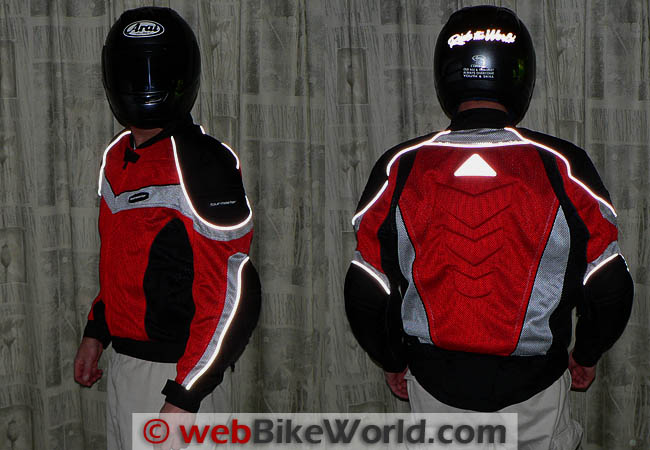

Reflectivity
The jacket makes extensive use of Phoslite reflective piping. In normal light, the piping appears to be a gray edging between colors, but when it is illuminated at night, the large quantity of piping appears as bright lines to make the rider visible.
Sizing and Adjustments
Some manufacturers cut and style their motorcycle garments for slim young riders or for those with what is euphemistically known as a “European” thin body shape. Tourmaster makes gear for real people and knows their target customer, however.
The lines of the jacket are oriented toward a realistic shape, but with eight adjustment points to take in the extra material. Each sleeve has two snaps and a cuff closure. The snaps provide the adjustments to allow the generous amount of armor to keep tender elbows protected.
The jacket also has two hook-and-loop straps at the waist. The trick is to adjust these when sitting to keep the jacket from riding up while sitting on a motorcycle.
The Tourmaster Intake Air Series 2 jacket is made in 18 different sizes for both men and women. Note that Tourmaster is one of the few companies that offers both regular cut and tall sizes.
For reference, the model in the photos is a 6 foot tall male, 200 pounds, and the jacket is a size XL/46. Buyers do have to exercise a bit of care in selecting a size because there can be so much variation when the liners are installed or removed.
The jacket should have a snug fit with the liners installed, because there is so much more room in the shell when the liners are removed.
Pockets
Depending on how the shell and liners are installed, you can hunt for that credit card in anywhere from 5 to 10 available pockets. The two exterior slash pockets have zippers and the six interior pockets have hook-and-loop closures. The two exterior hand pockets in the rain liner are the simple slash type with no closures.
Safety and Protection
While cut to look like a shorty jacket, the shape of the Intake Air Series 2 jacket is deceiving and offers a lot more protection. What is easy to miss is the lower rear line of the jacket. It is cut to fit lower than the typical belt line and has padding in the back. The model in the photos is wearing white slacks to illustrate this and how there is some protection for the hips and tailbone.
The large back pad is a tradeoff between protection and air flow. Tourmaster tipped the design to emphasize protection and I like it. On a hot summer day there will be a sweat spot under that big pad, which is a price I can live with.
On the outside of the shell and separate from the back pad are a series of chevron shapes that provide a little style while adding thickness to the back protection.
The shoulders and forearms have an extensive amount of molded plastic CE armor, plus other padding and heavy material, which is where much of the jacket weight is derived. Because Tourmaster did not skimp on coverage and provided the sleeve snaps to take in extra material, the armor should not slide around and expose elbows. This is a major problem with many mesh jackets and is a positive point in the jacket’s favor.
Conclusion
The Tourmaster Intake Air Series 2 jacket is a large and solid mesh shell with liners that can adapt for a wide variety of riding conditions. Even at full list price it is worth considering as a quality product that will provide good protection with good looks.
I like that it is cut and designed for people with “real” shaped bodies but has enough adjustment for anyone. Tourmaster or Cortech makes several similar jackets, so if you like the general features but perhaps not some of the styling details, the company offers a number of other models to consider.
More wBW Motorcycle Clothing Reviews
|
wBW Review: Tourmaster Intake Air Series 2 Jacket
|
|
|---|---|
| Manufacturer: Tourmaster | List Price: $179.99 |
| Colors:: Six versions with black shoulders/forearms: red, blue, neon yellow, silver, white, and all black. | Made In: China |
| Sizes: XS to 3XT, male or female. | Review Date: May 2011 |
Owner Comments and Feedback
See details on submitting comments.
From “C.P.” (05/11): “I’ve been riding with this jacket in blue for a few months (November). I’ve had it from 30F to 98F and it works great. Some sort of scarf in the winter works well, and I just stopped snapping everything in.
The rain liner works fine for me even in the heavy Florida rains I’ve been caught in. I had a 15 minute ride that soaked my gloves through while it was still in the high 50’s. No cold spots on my jacket; it was the only thing that didn’t get wet. Even my rain pants soaked through.
My only issue is the lack of pockets in the rain liner. When I was at the point where I was only removing the thermal liner to go between morning and afternoon rides, the lack of pockets in the afternoon disturbed me.
Above 98F I’ve found my leathers are cooler. Something to do with the wind chill effect working in reverse above 98F, I’m sure. Oh, and my left cuff doesn’t like to stay Velcroed down.”
From “G.H.” (05/11): “Does the Intake Air 2 jacket have a two way main zipper? Unfortunately the tall sizes are not yet available here in the USA. I enjoy reading your reviews. Great site.”
Bob’s Reply: The jacket has a basic one-way zipper. Tall sizes will be available in July, according to the distributor.
From “A.D.B.” (05/11): “I have had this jacket for 2 years and your review is spot-on. Heavy but with excellent ventilation and great protection.
In Florida, I find you will still stay relatively cool and dry in the jacket (if moving) even into the low 90’s and I ride a full fairing bike (K1200 GT). Granted it is heavy but it appears to offer better protection than most of the other “summer mesh” jackets that I have seen.
I pair it with the Tourmaster Venture Air Pants. The comments for the jacket are a match to the pants. I’ll gladly take the weight for the protection and fit. I have the High Vis Yellow version and it will get you noticed.”


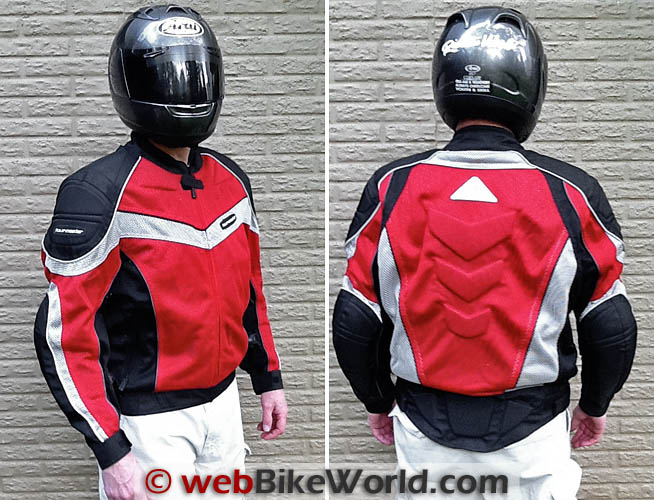
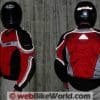
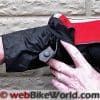
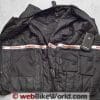
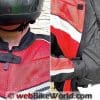
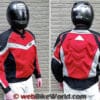
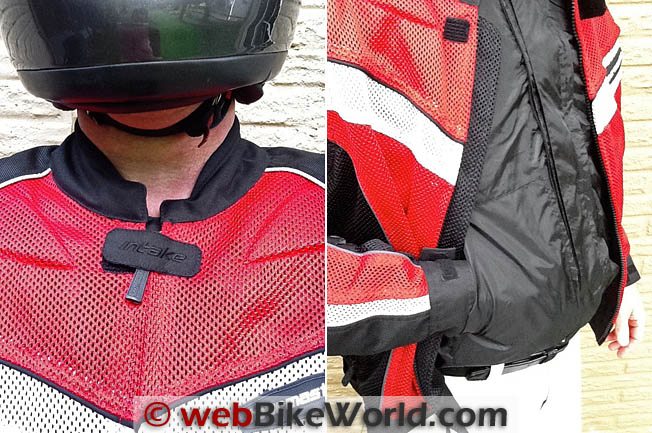
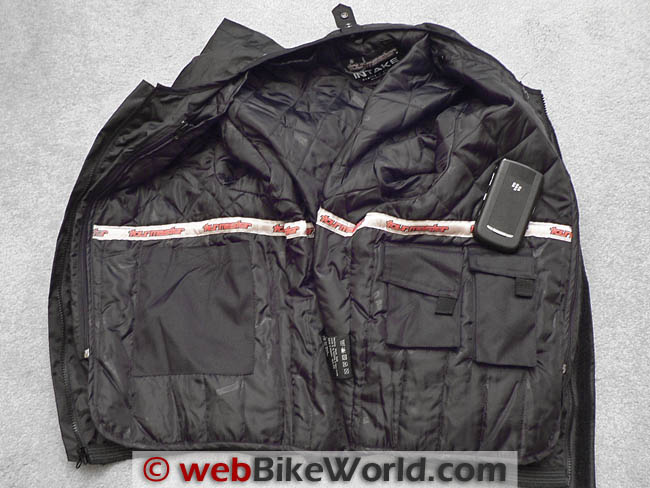
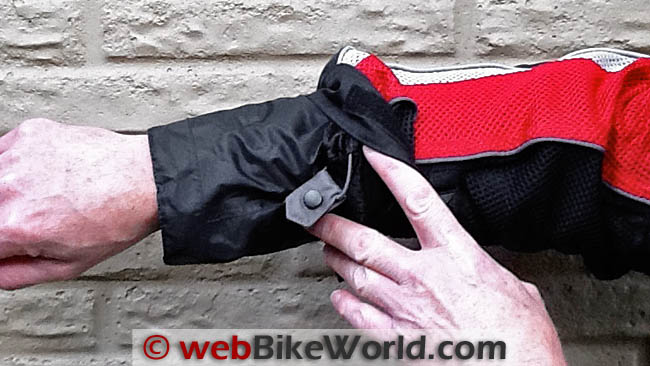
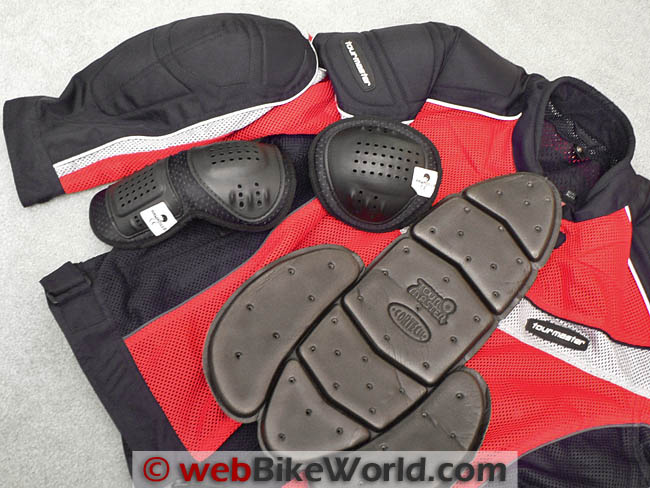 Water Resistant Liner
Water Resistant Liner